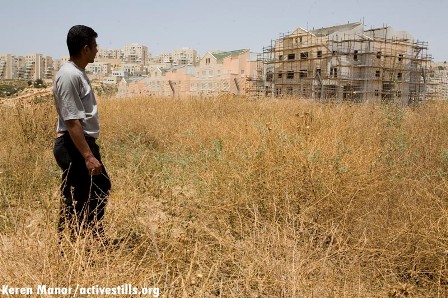The Supreme Court orders the State: explain why the new plan for the Matityahu East neighborhood shouldn’t be annulled
Eyad Burnat, head of the Bil’in popular committee against the wall, looking at the houses the real estate companies built without permits in Matityahu East from within the “Palestinian Enclave”
There are two petitions concerning the Matityahu East neighborhood in the settlement Modi’in Illit currently in front of the Supreme Court: HCJ 143/06, filed in January 2006, in an attempt to stop the illegal construction there; and HCJ 1526/07, filed in February 2007, after the Higher Planning Board at the Civil Administration decided to approve a new plan (210/8/1) which will legalize most of the illegal construction done. The context for both petitions is the route of the separation barrier, designed to allow the construction of the neighborhood on approximately 80 hectares of the lands of Bil’in on the “Israeli” side of the wall.
At the end of a four-hour (!) hearing held yesterday (June 3), the Court issued an order nisi (in HCJ 1526/07), ordering the State and the other respondents (the real-estate companies Heftsiba and Green Park, the local council Modi’in Illit and representatives of the flats buyers in the Matityahu East project) to argue why, in their opinion, the Higher Planning Board in Beit-El and the sub-committee for Objections “shouldn’t annul their decision to approve the 210/8/1 plan for the Matityahu East neighborhood in the settlement Modi’in Illit”. The order was issued by agreement among all sides (following the recommendation of the Court), so formally it was written that the petition will be considered “as if an order nisi was issued”, but legally and for every other purpose this means an order nisi was actually issued. The respondents are required to respond in writing by July 5th.
At the same time, the Court rejected the request of the respondents to cancel the temporary injunction in HCJ 143/06, issued on January 12th 2006, which forbids any further building in Matityahu East and any new residents moving in to flats therein. Judge Prokachya told the respondents that the Court will not cancel the temporary injunction before a final verdict is given in both petitions. This means that at least for the time being, no building can take place in Matityahu East and no new residents are allowed to move in.
The hearing focused mainly on procedural and planning issues pertaining to the work of the Higher Planning Board at the Civil Administration. However, these issues have important implications for the planning system in settlements in general, and in Modi’in Illit in particular. The outcome of the hearing is due largely to the excellent performance of attorney Michael Sfard, who represents the people of Bil’in and the Peace Now movement in both petitions. During the hearing, Judge Prokachya asked about the linkage between the new plan for the neighborhood and the route of the barrier – to the disappointment of the State representatives.
Background:
The land in question was handed over to two private real estate companies, “Heftziba” and “Green Park,” after it was confiscated by the Israeli authorities. This follows a typical pattern of settlement expansion, whereby Palestinian land is first declared Israeli state property and then eventually distributed to Israelis for private use. In 2000, the Metityahu Mizrach settlement was built without permits not only on the land that was confiscated, but also on the land that the Israeli Supreme Court recognized as privately owned Palestinian land. The route of the wall in Bil’in is designed not only to protect the settlers of Matityahu Mizrah but was designed according to the master plan of the settlement to allow for its future expansion. See B’tselem Report
In January 2006, the Israeli Supreme Court issued a temporary order in one appeal case (143/06), freezing the building and population of the Matityahu East settlement after the illegal building of 42 residential buildings – 20 of them without any building permits and 22 additional ones according to illegal building permits produced by the local committee of Modiin Elite.
For more background information, click HERE

